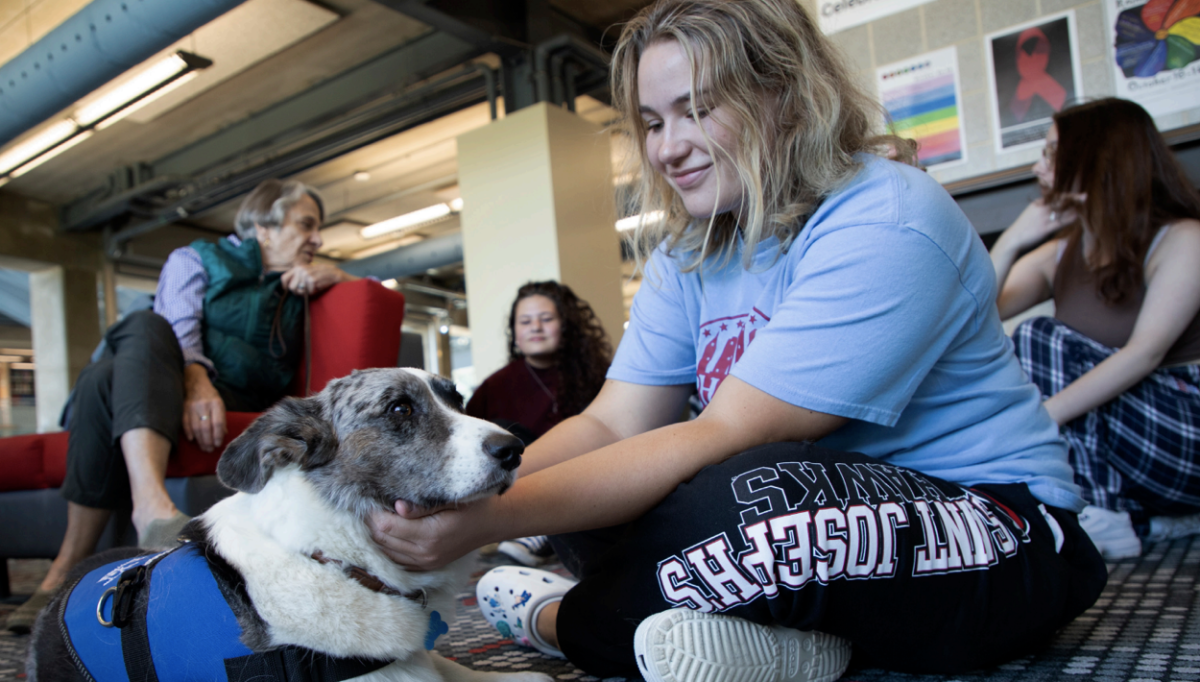Throughout the fall semester, the Post Learning Commons will be hosting therapy dogs biweekly for students to interact with during two hour time slots.
Most recently, Banjo, a two-year-old Corgi and his handler Diana Post, a volunteer working with Comfort Caring Canines, took over the second floor lounge on Oct. 6, interacting with eager students waiting to pet and play with him.
“I just think he makes people happy,” Post said. “People look at him and they just start to smile. I remember when I was in school, it was intense.”
Jen Hasse, head of access services and student experience said St. Joe’s, is working with Comfort Caring Canines, a therapy dog volunteer organization who have their volunteers come to sites such as St. Joe’s.
“I felt a good association with the library, but it’s also a place you associate with deadlines, test anxiety and all of that stuff,” Hasse said. “So we just wanted to bring something that makes students feel good and give them a break.”
Isha, a three-year-old black labrador retriever and her handler, Christa Vagnozzi also visit the Drexel Library to spend time interacting with students.
Vagnozzi said she raised five seeing eye dogs, and had Isha as a trainee as well. But Isha did not qualify because she had elevated liver enzymes.
Vagnozzi decided to bring Isha to St. Joe’s because students enjoyed her presence when she visited during her daughter’s soccer games when she played on the women’s soccer team at St. Joe’s.
“Some of the students last time said that it made their day,” Vagnozzi said. “They had asked their professors if they could leave early because they were so looking forward to come say hi to the dog because they missed their own dogs so much.”
Over 60% of U.S. colleges have a pet therapy program, according to a study in the American College Health Association. An overwhelming 96% of college students are in favor of pet therapy being available on college campuses, which makes sense since 65% of college students feel overwhelmed with anxiety according to the results of a study in “Modern Psychological Studies.”
The study also indicates that pet therapy has been proven to help students with participation in the classrooms, and students who participate in pet therapy programs also have a significant reduction in drop-out rate of college.
Hasse is aware of these benefits and said she knows that the canine visits help students feel calmer and take a break from college life.
“We know that our students are working really hard,” Hasse said. “And there’s stress associated with being a college student: studying, writing papers, managing your schedules. So therapy dogs are a proven way to help people reduce their stress. They can reduce anxiety just by spending some time with any animals.”
According to Hasse, the therapy dog visits are biweekly for the fall semester.
Julissa Espinoza ’26 attended one of the previous visits with Isha and said she was excited to see how the dog made others happy.
“It makes me excited to have events like this,” Espinoza said. “And to see it benefit not only me, but other students.”
At the moment, the Drexel Library lounge areas will be the only location for these events currently. But according to Hasse, there are thoughts of other spaces being viable options for these types of events.
“If there was any opportunity to bring a dog to the classroom or anything like that, we are both open,” Vagnozzi said.
Vagnozzi and other volunteers are open to different locations for these future events and will adhere to what the university allows.
Hasse said she knows that pet therapy can help students feel calmer, and giving them a break from being students with college workloads is a positive thing, “So many students tell us that they’re missing their dog or their home,” Hasse said. “You don’t really think about that sometimes. You leave your family behind, where you also leave your pet behind. So it makes students feel good, not just the animal.
The next canine visit is scheduled for Nov. 3 from 1-3:00 p.m. in the Drexel Library lounges.

















































